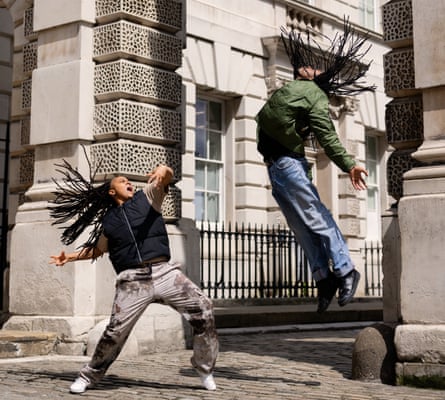Launched 45 years ago, Dance Umbrella festival has reached middle age, but there is nothing staid or middle-of-the-road about its programming under current director Freddie Opoku-Addaie. The month-long London-wide fest features an eclectic batch of UK premieres by international artists you haven’t heard of, plus local talent from a pan-London hip-hop battle to naked Taiwanese performance art. And that’s just the opening weekend.
Change Tempo is the first show: a double-bill of artists new to the UK, and a surprisingly arresting solo from Taiwan’s Su PinWen. Su uses he/they pronouns, but the body that strips bare in front of us appears female. There’s a world of gender expectations to explore but the piece, Girl’s Notes, also reads as a simple feminist statement.
Su arrives on stage in a tight dress with a long bleach-blonde plait, balancing a hardback book on his head – a model of finishing school deportment training. He lays out the contents of a suitcase (coffee maker, microphone, vibrator), undresses and slowly bends his body into various studied poses, bluntly displaying nooks and crannies, all the while remaining proud-necked, with a benign expression as the book stays in place. It’s like a swan with serenity on top and complicated manoeuvres beneath. Such is a woman’s work.
While you’re distracted by the events on stage – Su sipping coffee, pianist Lin Mai-Ke beautifully playing Chopin Nocturnes, the splayed-legs yoga poses – and possibly thinking, “Oh gosh, what is he going to do with that vibrator?”, it’s easy to forget Su is engaged in this balancing act the whole time, held tense by the book’s weight. In the same way, we forget or cease to notice the strictures we operate under, or fail to see the weights others carry. It’s an effective metaphor that accrues power the more the piece goes on.

The companion piece is Comme un Symbole, by French choreographer Alexandre Fandard. A short, gnomic work on misunderstood disaffected youth, with Fandard wearing a tracksuit and aggrieved attitude, it is reminiscent of Oona Doherty’s studies of working-class male stereotypes, but more enigmatic. It is actually too sparse, perhaps. Some of the physical flourishes, the arms scrolling through shadows, make you want to see more of Fandard’s dancing.
From the international to the homegrown. The London Battle pits hip-hop crews from north, south, east and west London against each other, as part of a day’s free events in the courtyard at Somerset House. The sightlines aren’t great, and that’s a problem when you can’t see dancers’ feet, but for those with a good view there are skilful moves from all compass points. The west Londoners show off solid breaking skills; Rory Clarke brings real slinky style for the north, alongside world-class B-Girl Stefani. The south have charm and the most fun – there is mightily impressive popping from Nicholas Marvel and a buoyant B-Girl Roxy, who brings out the headspins when it matters. The east London trio, led by Jordan “J-Funk” Franklin, are tightly wound and explosive, and ultimately the victors, but the warm sense of community here is stronger than that of competition.
This post was originally published on this site be sure to check out more of their content.


